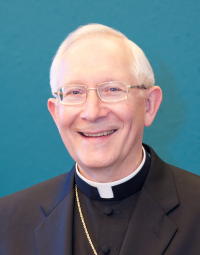
Archbishop Leonard P. Blair
June 10/11 is the Solemnity of Corpus Christi, “the Body (and Blood) of Christ,” which He Himself gives us in the Eucharist at every Mass. This year’s observance has special significance because it marks the beginning, at the parish level, of what the U.S. Bishops hope will be a “Eucharistic revival” in the United States.
A life centered on the Eucharist has many dimensions, as Pope St. John Paul the Great pointed out in a letter entitled, in Latin, Mane nobiscum Domine. It means “stay with us, Lord,” the words spoken by two disciples on the road to Emmaus at Easter when Jesus appears walking with them, though unrecognized, until that moment when he “breaks the bread” and their eyes are opened to who he is.What is especially important about Pope St. John Paul’s letter is that it covers all the dimensions, all the implications of our Catholic belief in the Eucharist; namely the following:
The Importance of Sunday Mass, not only for ourselves, but for our families, neighbors and friends every weekend and holy day. As his creatures we owe God our Sunday worship “in spirit and truth,” and he in turn wishes to shower upon us all the blessings and graces that the Eucharist affords.
Openness to All the Eucharist’s Dimensions. Is the Eucharist a sacrifice or a meal? It is both: “No dimension of this sacrament should be neglected. We are constantly tempted to reduce the Eucharist to our own dimensions, while in reality it is we who must open ourselves up to the dimensions of the Mystery.”
Listening to the Word. Every Eucharistic celebration is a unity of two “tables,” the table of the Lord’s Word and the table of his Body and Blood. When it comes to the Scripture readings at Mass, what is important is our “care, preparation, devout attention and meditative silence.”
Giving Thanks. In the Greek language of the New Testament, the very word eucharist means “thanksgiving.” This is an urgent necessity in a world marked more and more by “forgetfulness of God and a vain pursuit of human self-sufficiency.”
Christ’s Real Presence. For years now, research polls taken in our country suggest that Catholics are drifting away from a firm affirmation of the real presence of Christ in the Eucharist, as the Church believes and teaches that doctrine. Pope St. John Paul writes: “This presence…is called ‘real’ not in an exclusive way, as if to suggest that other forms of Christ’s presence are not real, but par excellence, because Christ thereby becomes substantially present, whole and entire, in the reality of his body and blood … The Eucharist is a mystery of presence, the perfect fulfillment of Jesus’ promise to remain with us until the end of the world.”
Eucharistic Adoration. Eucharistic adoration “should become a particular commitment for individual parish and religious communities … The presence of Jesus in the tabernacle must be a kind of magnetic pole attracting an ever greater number of souls enamored of him.” In our archdiocese I continue to ask for this adoration in our parishes, but always in accordance with sound liturgical practice, as found in the appropriate norms.
Communion with One Another in Christ. “The Church is the Body of Christ: we walk ‘with Christ’ to the extent that we are in relationship ‘with his body.’” We must resist the temptation to see ourselves or our relationship to Christ in isolation, without reference to the whole Church and all her members. The Eucharist is a profoundly communal act.
Evangelizing the Other Six Days of the Week. “The dismissal at the end of each Mass is a charge given to Christians, inviting them to work for the spread of the Gospel and the imbuing of society with Christian values.” The great challenge for each of us is to make a connection between faith and everyday life. “We should not be afraid to speak about God and to bear proud witness to our faith.”
Serving our Brothers and Sisters in Need. This point is last but certainly not least. The very authenticity of our Eucharistic celebrations is ultimately judged by “our mutual love and, in particular, by our concern for those in need.” This is not just a matter of charitable giving, but “a practical commitment to building a more just and fraternal society.”
There is indeed much to ponder and pray over in these Eucharistic themes. May they guide and inspire us during the coming months, as together we respond to the spiritual opportunities that the Eucharistic Revival presents.
